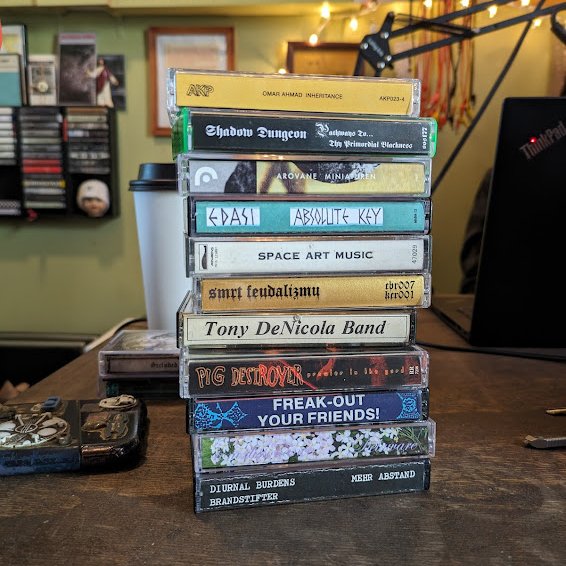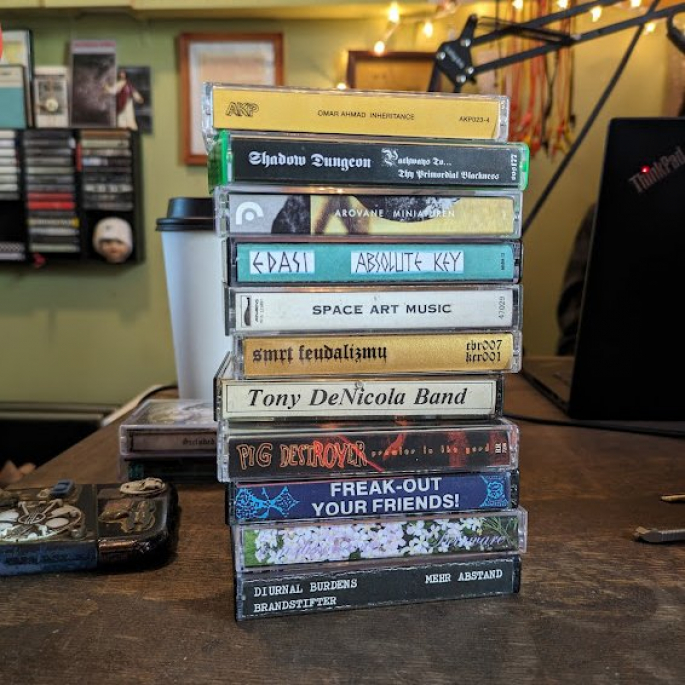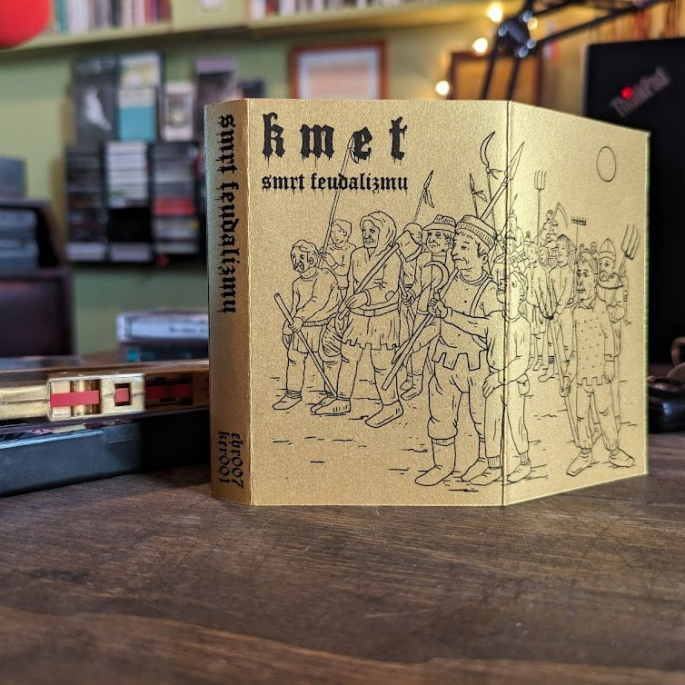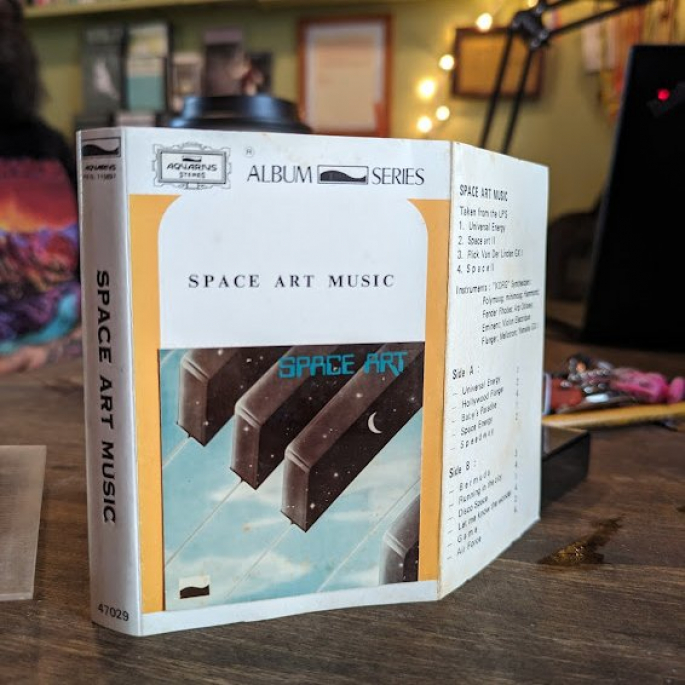Tabs Out | Episode 196
Episode 196
3.28.24
Universal Energy – Space Art Music comp (Perina Stereo)
Aaron Dilloway – Freak-Out Your Friends (Hanson)
Pig Destroyer – Prowler in the Yard (Relapse)
Shadow Dungeon – Pathways To... The Primordial Blackness (Out of Season)
Omar Ahmad – Inheritance (AKP)
Arovane – Miniaturen (Puremagnetik)
Diurnal Burdens & Brandstifter – Merh Abstand (sPLeeNCoFFiN)
Tony DeNicola Band – s/t (self released)
Tom Dissonance – Delaware (Amoebic Industries)
KMET – Smrt Feudalizmu (Cosmic Brood / Kletva Crne Ruže)
Absolute Key – Edasi split (Maniac Mutant Music)
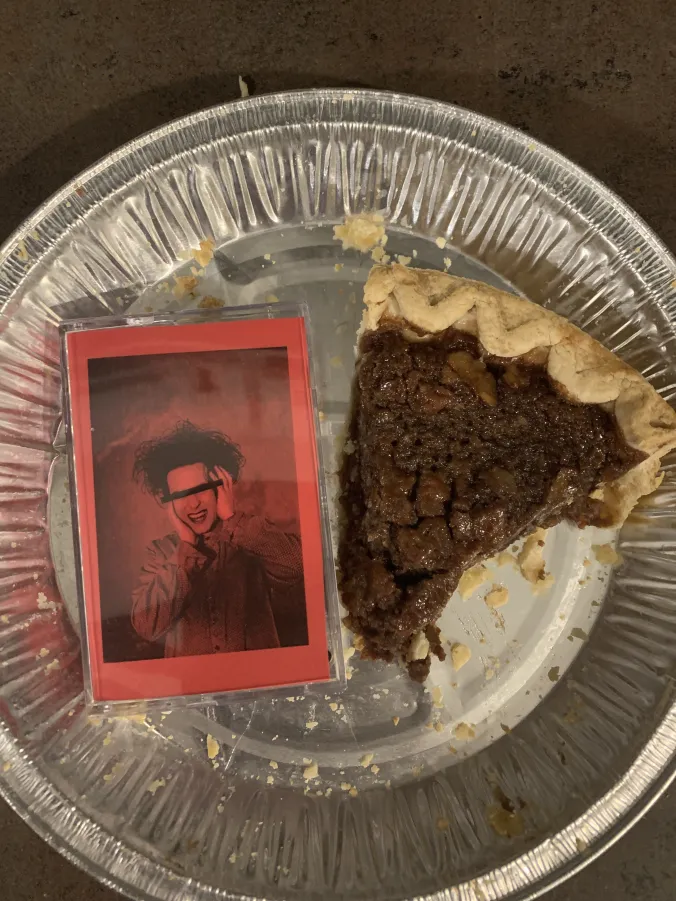
David Nance – 2 Tapes: David Nance & Mowed Sound and Shameless Kiss
2.28.24 by Zach Mitchell
Tabs Out | David Nance – 2 Tapes: David Nance & Mowed Sound and Shameless Kiss
David Nance – 2 Tapes: David Nance and Mowed Sound & Shameless Kiss
2.28.24 by Zach Mitchell

I love an artist with a confusing discography. There is no joy quite like listening to an album from a new-to-me band, opening up Discogs, and being confronted with a litany of tapes, 7”s, and deleted Bandcamp entries. The ephemera ends up telling a story of merch tables and order pages of yore – tales of ultra prolific artists who understand their way around a Tascam machine or Garageband. David Nance follows in the path of Yo La Tengo and Lou Barlow on his way to creating a confusing, wonderful legacy.
In the last three months, Nance has released David Nance & Mowed Sound, a full fledged studio album on Third Man Records featuring his live band, and Shameless Kiss, a Bandcamp only cassette release on Western Records. Shameless Kiss is a full album cover of The Cure’s classic Disintegration that replaces the synthesized strings and glorious moping with homespun banjo. Western Records, as best I can tell, is Nance’s label for releasing almost exclusively short run tapes. He’s covered albums like Beatles For Sale and Goat’s Head Soup in his signature style and released them alongside stray live albums. Previous studio albums, both under his name and under the band name David Nance Group (somehow different from David Nance & Mowed Sound), have been released on labels like Trouble In Mind and Petty Bunco. And all of that is before you start getting into the self released cassettes and the 7”s.
That’s all well and good, but what does this motherfucker actually sound like? It’s a hard question to answer. There are multiple Davids – Neil Young-esque guitar shredder David, campfire folkie David, hunkered down chooglin’ and groovin’ David, cassette deck master David, etc. David Nance and Mowed Sound mostly stays within the folkin’ and chooglin’ vein with high end indie label production. It’s a bit more restrained than his previous studio albums, focusing more on the quiet moments in between the storms of guitar than his previous works.
A sizable chunk of the songs on David Nance and Mowed Sound have shown up previously in his discography. My favorite song on the album, and the one that’s gone through the most drastic transformation, is “Credit Line.” This version, labeled “Variant 5” (though I can only find two other studio versions of the song) gets transformed from a Flying Nun style lo-fi jangle rocker (Pulverized and Slightly Peaced) and a humid psych-folk tune (Meanwhile, his 7” debut for Third Man Records) to subdued boogie with sinewy guitar leads running throughout. “Cure vs Disease” gets a facelift from a murky psych excursion (Basket Music w/Gun Outfit, a release I did not know existed until writing this) and a noisy folk jam (September 20, 2020, maybe my favorite David Nance release) to a 70s slide guitar head nodder. The idea of Nance as a folk rocker troubadour is not a new one in his discography, but sounding this hi-fi definitely is. It’s his highest profile album to date, so why not go big instead of going home?
Instead of presenting every side of Nance at once, David Nance & Mowed Sound selects a smattering of would-be greatest hits, gussies them up, and presents them alongside a handful of new tracks that tie them together. The idea here is clearly to introduce new fans to his work, but is this the place I’d suggest someone start with Nance? Honestly, no. The shaggy dog Crazy Horse style jamming on Peaced and Slightly Pulverised might be more advisable, but then again you would completely miss out on the softer spoken impulses that this album is pulling from. Maybe there isn’t a great place to start. This record has great songs – dig the harmonies on the opening stomper “Mock the Hours” and the infections, simmering, ouroboros groove on “Cut It Off” – but there’s a bit more restraint here than I’d like. I’m hearing ripping solos and soaring vocals (probably from my own familiarity with Nance as a live act) that just aren’t here. I like the album, but I’m left wanting a little more. Nance’s strengths lie in his ability to be a choose-your-own-adventure artist. My adventure lies elsewhere.

Shameless Kiss is one of Nance’s most exciting releases and his best covers album to date. Nance is absolutely fearless when playing fast and loose with one of the most seminal rock albums of all time and the high risk pays high rewards. Whether it’s replacing the toms in “Closedown” with the driving drums of “Out of Step” or turning “Lullaby” into the depressing alt-country classic “Dinner,” Nance isn’t afraid to reconfigure the established canon into something new. Nance teases some new wave out of “Disintegration” on “Shameless Kiss” by upping the tempo and accentuating the chiming guitars. The familiar becomes new again. Sonically, this is the mode in which I enjoy Nance the most – half obscured by fuzz, losing himself in a riff, and calling back to something you think you might’ve heard once or twice somewhere distant.
It’s tough to review Shameless Kiss without just gushing about Disintegration, but if you’ve ever wondered what a midwestern Robert Smith would sound like, you have your answer. Your opinion on this album may depend on how repulsive that idea is to you. Disintegration is instantly recognizable not just from Smith’s yowl, but from the distinctive reverb soaking every track. It’s an album that completely drowns in its own melodrama. Nance makes the bold choice of replacing it completely with tape hiss, substituting Smith’s widescreen sadness with a stark loneliness. The result not only makes it a great The Cure covers album, but a piece that stands alone in Nance’s vast discography.
I may prefer Shameless Kiss to David Nance & Mowed sound, but this is one of the best parts about being a David Nance fan, or really any artist with a discography full of rapid left turns. If I’m not in tune with the folk rock on David Nance & Mowed Sound, I can dive back deeper into the well and come back with a low fidelity version of a classic. I can appreciate the clean cut big ticket indie label version of Nance while still hoarding my scuzzy tapes. Maybe the campfire-come-to-life sound on Staunch Honey will connect with me more. Or maybe I’ll dig into the blown out rock and roll with Negative Boogie. All of these disparate pieces add up to one of the most compelling artists in America today. David Nance & Mowed Sound and Shameless Kiss are just two pieces of an ever evolving puzzle.
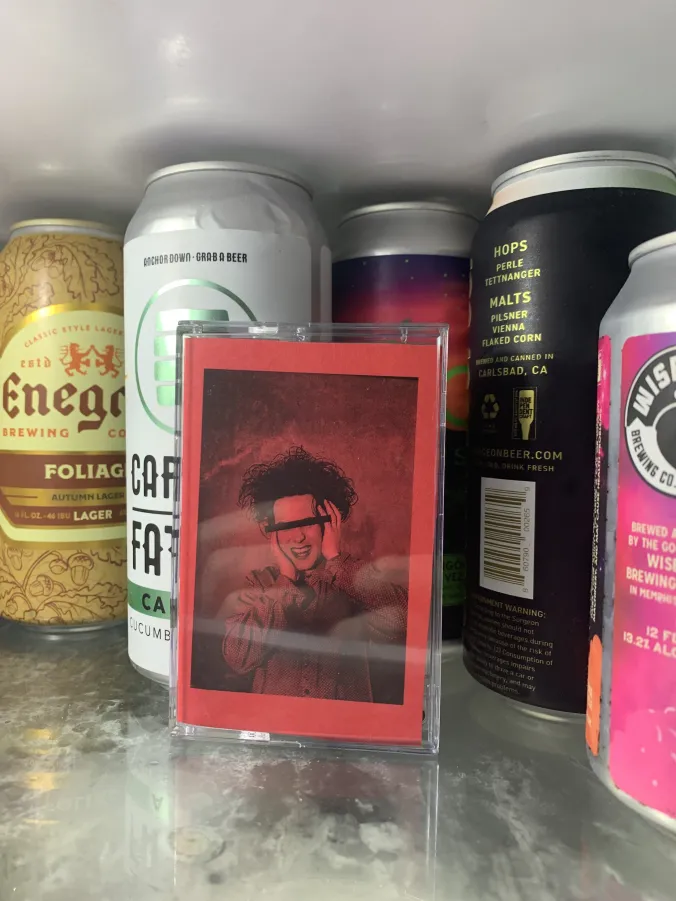
Tapes sold out at Third Man & David Nance personal source!

